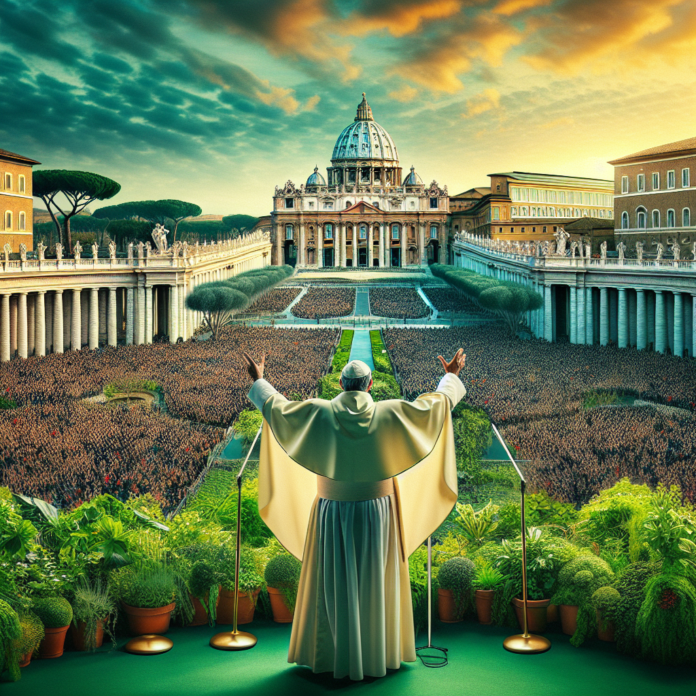Vatican Announces Bold Initiatives in Response to Global Climate Change: A New Era of Catholic Environmental Advocacy
In an unprecedented move that underscores the Vatican’s commitment to environmental stewardship, the Holy See unveiled a series of robust initiatives to address the escalating global challenge of climate change. The announcement, made during a special assembly in Vatican City, signifies a critical shift towards more assertive and progressive Catholic environmental advocacy.
Pope Francis, who has consistently positioned himself as a champion of ecological conservation since his 2015 encyclical Laudato Si’, has set the tone for this transformative era. The encyclical, which discusses the care for “our common home,” paved the way for the Vatican’s ongoing dialogue on environmental issues. This latest declaration reflects the Pope’s continued urging for immediate action to protect the planet and defend vulnerable communities affected by climate shifts.
An Ambitious Agenda
The series of initiatives presented aim to harness both spiritual and tangible resources. Central to the Vatican’s strategy is the newly established "Global Catholic Climate Network" (GCCN), a colossal step designed to unite Catholic institutions worldwide in a shared commitment to sustainability and ecological justice. This network will coordinate efforts, share knowledge, and amplify the pioneering work of Catholic organizations already active in climate advocacy.
The Vatican’s agenda is characterized by its seven pillars of action:
-
Green Transition for Catholic Institutions: The Vatican’s commitment extends to a comprehensive, global audit of carbon footprints across Catholic institutions, followed by a roadmap to achieve carbon neutrality by 2050. This includes transitioning ecclesiastical sites to renewable energy sources, reducing waste, and implementing sustainable practices.
-
Ecological Education: In a bid to create environmental awareness from the grassroots, the Vatican will introduce a progressive curriculum across Catholic educational institutions worldwide. This curriculum will focus on sustainability, ecological ethics, and the science of climate change, ensuring the next generation of Catholics are well-informed stewards of the Earth.
-
Support for Climate-Impacted Communities: The Holy See recognizes that the poorest and most vulnerable bear the brunt of climate impacts. Consequently, the Vatican plans to increase funding to support adaptation and resilience-building projects in climate-affected regions, particularly in the Global South.
-
Promotion of Disinvestment from Fossil Fuels: In a bold financial maneuver, the Vatican calls for dioceses and Catholic institutions to divest from fossil fuels. By redirecting investments to clean energy sectors, the Vatican aims to set a precedent for responsible investment in line with its ethical commitments.
-
Interfaith and Global Partnerships: Recognizing that climate change transcends borders and beliefs, the Vatican is strengthening interfaith dialogues and partnerships to foster a united front in the fight against environmental degradation. Notably, Pope Francis’s outreach to leaders of other religious and secular communities continues to galvanize collective action.
-
Advocacy for Stronger International Climate Policies: The Vatican is also stepping up its advocacy on the international stage, championing ambitious targets within frameworks such as the Paris Agreement. The Holy See commits to using its diplomatic influence to support policies that protect and preserve the environment for future generations.
- Integrating Indigenous Knowledge and Perspectives: Acknowledging the wisdom of Indigenous communities who have long been stewards of biodiversity, the Vatican emphasizes the importance of integrating traditional ecological knowledge into environmental solutions.
A Call to Arms for Catholics Worldwide
These initiatives underscore not only the Vatican’s theological commitment to creation care but also a pragmatic response to an urgent global issue. Vatican Secretary of State, Cardinal Pietro Parolin, emphasized during the assembly that "addressing climate change is not merely an environmental agenda; it is a deeply moral imperative that calls for action from every Catholic."
Cardinal Parolin’s statement was echoed by the applause of attendees, underscoring the collective resolve within the Church to be leaders in climate action. The Vatican’s announcement arrives at a pivotal moment as the COP28 climate conference approaches, where world leaders will convene to discuss renewed commitments and strategies to combat climate change. The Catholic Church’s intensified focus on the climate might inspire other religious and moral institutions to embark on similar paths.
Looking Ahead
As these initiatives unfold, their implications will resonate far beyond the walls of Vatican City. By aligning moral and spiritual values with environmental policy, the Vatican is not just calling for change, it is embodying it. The response from Catholic communities worldwide is likely to be significant, as these measures reflect a powerful call to live out faith in tangible, sustainable ways.
In doing so, the Vatican cements its role not only as a spiritual guide but also as a pivotal player in the global dialogue on climate action. The connection between ecological welfare and human dignity has perhaps never been clearer within the Church’s mission. The bold moves announced signal a new chapter where spiritual advocacy meets scientific urgency—united under a shared vision for the planet’s future.
In this new era of Catholic environmental advocacy, the introduction of the Vatican’s sweeping initiatives stands as a message of hope and solidarity—a resounding declaration that safeguarding our Earth is not just a choice but a sacred duty.
